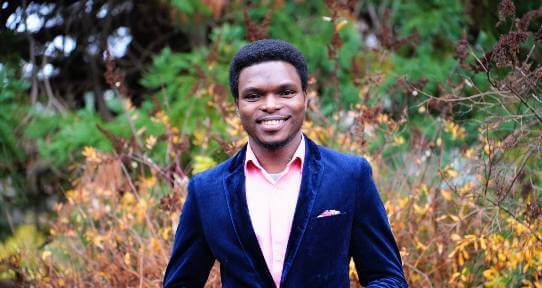New CIHR award helps post-doc fight infectious diseases using statistics

March 7, 2024 | by Nicole Crozier, Science Communications Officer
Kehinde (Kenny) Olobatuyi is working on the forefront of public health, but it’s unlikely you’ll see him with a stethoscope or wandering the halls of a hospital. As a statistician, he makes his impact from behind a computer, immersed in large quantities of data, looking for patterns and developing algorithms.
Olobatuyi, an Aspiration 2030 post-doctoral fellow, specializes in computational statistics and high-dimensional data. As a post-doc, he’s still at the beginning of his career, but his goal is to secure a tenure-track faculty position where he can specialize in the development of ground-breaking methods for health analytics.
Olobatuyi was recently awarded a Research Excellence, Diversity and Independence (REDI) Early Career Transition Award from the Canadian Institutes of Health Research (CIHR), and is now one step closer to reaching that goal.
“Winning this award means a lot to me. The award allows me to lead my own project and begin taking steps toward developing an independent research program while still benefitting from the guidance and mentorship of experienced researchers. It’s a major milestone to win a grant, and it’s great to know that my research is perceived to be important.”
- Kehinde Olobatuyi, Aspiration 2023 post-doctoral fellow in statistics
The CIHR REDI Early Career Transition award was created in 2022 and is intended to help post-doctoral researchers, clinicians and research associates from specific underrepresented groups launch their research faculty careers in Canada. In phase one of the award, recipients will receive tailored, mentored career development to help them develop into independent research scientists. In phase two, recipients will begin to establish and sustain their own independent research program.
Using statistics in support of public health
Olobatuyi’s interest in statistics started during his undergraduate degree in Nigeria, and the projects he has worked on have always had a health focus. As an undergraduate student, he examined trends related to fatalities caused by road traffic accidents, his master’s degree focused on modelling the survival time of breast cancer patients, while in his PhD, which he completed in Italy, he developed a statistical algorithm to improve the accuracy of medical imaging diagnosis using MRI/PET scans.
More recently, Olobatuyi has become interested in helping in the fight against emerging infectious diseases. Currently, his research is focused on questions relating to COVID-19 and bacterial pneumonia and he is working to quantify the burden of disease, monitor trends and predict new virus variants. Working with statistics professor Laura Cowen, Olobatuyi has been building a model to enumerate the actual number of people who have been infected with COVID-19—a number that is currently widely recognized to be under-reported. He has also developed a new model to estimate the prevalence of Streptococcus pneumoniae serotypes, the pathogens that cause bacterial pneumonia.
Moving forward, Olobatuyi aims to develop models that can predict the genetic evolution of the viruses and bacteria associated with the most common infectious diseases. By understanding the evolutionary pattern of these viruses and bacteria, he will be able to predict the emergence of new variants, which will allow health services to be well informed and better prepared prior to outbreaks.
“I’m very excited that this award gives me the opportunity to learn more about computing. I really want to help develop the computational side of statistics. In the era of big data, we need to keep working on better ways to analyze increasingly large data sets.”
- Olobatyui
More than just research
While Olobatuyi is committed to his research, he will also be using this award to develop skills in other areas, such as supervision and mentorship, teaching, and science communication. Starting this fall, he will be co-supervising undergraduate and graduate students alongside Cowen, and he’s planning to continue teaching UVic’s first-year undergraduate statistics course. He will also be attending conferences to present his work, delivering invited seminar presentations and volunteering with the Western North American Region of the International Biometrics Society as a student competition paper judge.
"I am so proud to have Kenny as a member of my lab,” says Cowen, Olobatuyi’s supervisor. “You don’t normally think of public health research when you think of the department of mathematics and statistics and it is unusual to find a CIHR grant holder there. However, Kenny’s enthusiasm, positive attitude and exceptional quantitative ability make him the perfect person to tackle public health problems involving big data that require advanced statistical methods.”
